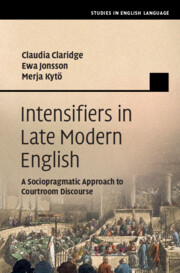Book contents
- Intensifiers in Late Modern English
- Studies in English Language
- Intensifiers in Late Modern English
- Copyright page
- Dedication
- Contents
- Figures
- Tables
- Acknowledgements
- Abbreviations and Notations
- Chapter 1 Introduction
- Chapter 2 Theoretical and Methodological Considerations
- Chapter 3 Intensifiers
- Chapter 4 Corpus Methodology and Overview of Data
- Chapter 5 Maximizers
- Chapter 6 Boosters
- Chapter 7 Downtoners
- Chapter 8 Multivariate Analysis
- Chapter 9 Intensifiers across Time
- Chapter 10 The Pragmatics of Intensifiers
- Chapter 11 The Sociolinguistics of Intensifiers
- Chapter 12 Conclusion
- Book part
- Bibliography
- Index
Chapter 11 - The Sociolinguistics of Intensifiers
Published online by Cambridge University Press: 15 March 2024
- Intensifiers in Late Modern English
- Studies in English Language
- Intensifiers in Late Modern English
- Copyright page
- Dedication
- Contents
- Figures
- Tables
- Acknowledgements
- Abbreviations and Notations
- Chapter 1 Introduction
- Chapter 2 Theoretical and Methodological Considerations
- Chapter 3 Intensifiers
- Chapter 4 Corpus Methodology and Overview of Data
- Chapter 5 Maximizers
- Chapter 6 Boosters
- Chapter 7 Downtoners
- Chapter 8 Multivariate Analysis
- Chapter 9 Intensifiers across Time
- Chapter 10 The Pragmatics of Intensifiers
- Chapter 11 The Sociolinguistics of Intensifiers
- Chapter 12 Conclusion
- Book part
- Bibliography
- Index
Summary
The chapter deals with the influence of gender and social class on intensifier usage in the Old Bailey Corpus (1720–1913), based on an overview of both modern sociolinguistic research and an overview of gender and class in Late Modern London. Gender is statistically a more important predictor than class for intensifiers as a whole and for boosters in particular. Similar to modern findings, a male preference for downtoners, maximizers, and generally more formal types is found here. Female speakers exhibit a booster preference also both today and in the Old Bailey data, but they show a generally less varied inventory of intensifiers in the past. Late modern higher-class speakers, who belong to the more educated segments of society, use more maximizers and more downtoners (excluding a little), which mirrors modern tendencies. They also prefer more formal, borrowed items and they use a greater diversity of types.
- Type
- Chapter
- Information
- Intensifiers in Late Modern EnglishA Sociopragmatic Approach to Courtroom Discourse, pp. 263 - 287Publisher: Cambridge University PressPrint publication year: 2024



